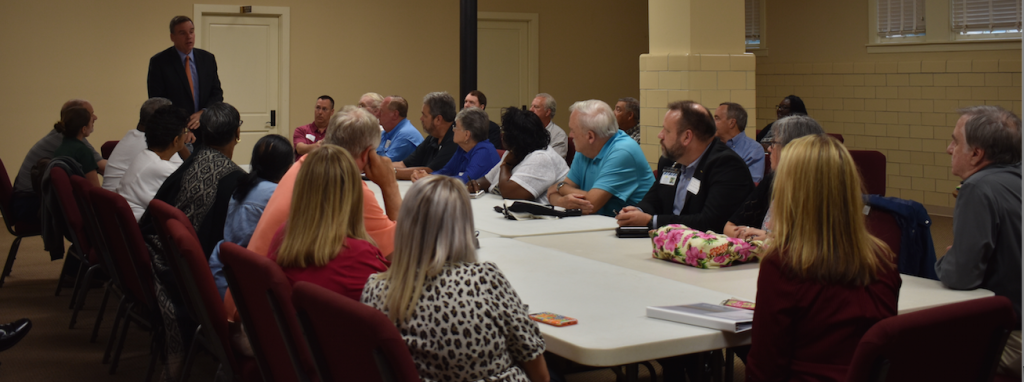Warner visits Lunenburg
Published 12:01 pm Wednesday, June 12, 2019

- Sen. Mark Warner speaks about health care, broadband and economic development during a meeting held Friday in Lunenburg.
Sen. Mark Warner visited Lunenburg County leaders and residents on Friday at the Kenbridge Town Hall. While there, residents and Warner discussed health care, broadband access, public school funding and economic development.
Warner spoke about his recent activity and a delay in visiting areas in the region, which included visiting Bedford for the 75th anniversary of D-Day. He said he planned to visit Danville, Lynchburg and Halifax earlier in the morning, but spoke about the shooting in Virginia Beach. He praised first responders who protected others at risk to themselves and said that there were too many active shootings in the United States and Virginia.
Warner spoke about recent activities to attempt to lower the cost of drug prices and to make more clear to the public which doctors are covered under their health insurances, to make the United States competitive to China in technological advancement and accelerating broadband access in Southside Virginia, and about effects of high tariffs on the U.S. economy and agriculture.
Trending
He spoke about the importance of prioritizing people to solve some of the larger issues in Virginia.
“Right now, even though every company says, ‘my biggest asset is my people,’ there is nothing in our tax code, or accounting system, … that actually incents you to invest in a human being,” Warner said.
“We have to raise the value of investing in people,” Warner said.
He took questions and comments from members of the audience.
Jay Stafford, CEO of Benchmark Bank, thanked Warner for past advocacy for banks in rural areas and spoke about the struggle of smaller banks to stay afloat, citing recent closures or merges with larger banking organizations.
Warner thanked Stafford and said rural areas are seeing struggles that need to be addressed. He also praised counties’ resilience, citing the recent economic boom in Danville as an example.
Trending
He said that opportunity and enterprise zones provided by the Virginia Department of Housing and Community Development, which encourage job creation and growth through partnerships between local and state governments, could be helpful.
County Administrator Tracy Gee noted that Lunenburg County, nor other counties in the region except for a portion of Prince Edward County, had zones.
Patricia Harper-Tunley spoke about the need for broadband access specifically in Lunenburg. While a recent partnership allowed for broadband in Mecklenburg and Halifax counties, it doesn’t reach all localities in the region that need broadband.
“My question is how do we tap into something like that and at least get the ball rolling,” Harper-Tunley said. “When you talk about more jobs, when you talk about health care, and telework, all of those seems to rely on broadband, and being able to not just have it, but viable broadband.”
If a doctor, she said, has to go out in a field to get reliable broadband, then it becomes a priority for the area.
Warner encouraged the region, in the short term, to collaborate with Microsoft and to push for greater action and resources.
Concerning the white space project by Microsoft for Halifax and Charlotte counties, Warner cited that he believed the project has not moved aggressively enough to provide broadband coverage.
Stafford, Brown’s Store Supervisor Mike Hankins and County Planner Glenn Millican spoke about the need for economic development in the region, and steps being made to achieve it, such as the advent of the FASTC at Fort Pickett and talks of an inland port at the Heartland Industrial Park.
Hankins joked that the county was becoming “the state’s largest retirement community.”
He pointed out an instance with Lunenburg County Public Schools, in which the Commonwealth Regional Council (CRC) and school officials wrote a grant for new school buses, as two school buses in the county were approximately 14 and 17 years old respectively.
However, when speaking with a government agency, the agency reportedly told school officials that the buses were too old to qualify for the grant. The grant accepted buses that were between three to seven years old, Hankins said, and that the buses had to be recycled and taken apart.
“We are working our butts off, and doing the best we can with just a little bit,” LCPS Superintendent Charles Berkley said about the challenge of receiving funding for the school division. But he said the area needs more help to achieve it.
Warner agreed that rural areas in particular faced a disadvantage with grant funding, and said that he could collaborate with the county and the CRC to help work through the challenges.
CRC Executive Director Melody Foster noted the region is in need of support, citing lack of industry, the high rate of young people who move away and aging infrastructures.
Tameka Vaden with the Southside Outreach Group, the organization that recently installed indoor plumbing for a residence in Kenbridge, spoke about the challenges of affordable housing in the area.
Warner agreed and said from an economic standpoint it doesn’t make sense to keep the status quo the way it is, arguing for housing reform.




